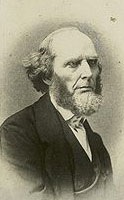 Jerry Falwell bezeichnete ihn als »einen seiner Helden und als Helden vieler Evangelikaler, einschließlich Billy Graham«. Keith Green und einige Leiter von »Jugend mit einer Mission« haben ihn verehrt. Für mache Evangelisten ist er nach wie vor ein großes Vorbild. Sein Einfluss auf die Evangelikale Bewegung reicht weit über den angelsächischen Raum hinaus.
Jerry Falwell bezeichnete ihn als »einen seiner Helden und als Helden vieler Evangelikaler, einschließlich Billy Graham«. Keith Green und einige Leiter von »Jugend mit einer Mission« haben ihn verehrt. Für mache Evangelisten ist er nach wie vor ein großes Vorbild. Sein Einfluss auf die Evangelikale Bewegung reicht weit über den angelsächischen Raum hinaus.
Michael Horton erklärt uns die desaströse Theologie von Charles Finney (1792–1876):
The first thing we must note about the atonement, Finney says, is that Christ could not have died for anyone else’s sins than his own. His obedience to the law and his perfect righteousness were sufficient to save him, but could not legally be accepted on behalf of others. That Finney’s whole theology is driven by a passion for moral improvement is seen on this very point: »If he [Christ] had obeyed the Law as our substitute, then why should our own return to personal obedience be insisted upon as a sine qua non of our salvation?« (p. 206). In other words, why would God insist that we save ourselves by our own obedience if Christ’s work was sufficient? The reader should recall the words of St. Paul in this regard, »I do not nullify the grace of God; for if justification comes through the law, then Christ died for nothing.« It would seem that Finney’s reply is one of agreement. The difference is, he has no difficulty believing both of those premises.
Finney, der glaubte, sogar Macht über Gott zu haben, bekannte übrigens in seinen späteren Jahren: »Die Bekehrten meiner Erweckung sind eine Schande für das Christentum«.
Hier der vollständige Artikel »The Legacy of Charles Finney«: www.modernreformation.org.
Ähnliche Beiträge:
- Keinen Beitrag gefunden